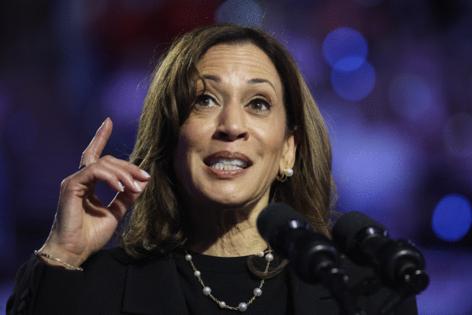More Kansans are donating to Harris than Trump: 'Whatever she needs to do to win'
Published in Political News
WICHITA, Kan. — Presidential elections in Kansas usually don’t offer much in the way of suspense.
The last Democratic nominee to carry the state was Lyndon Johnson in 1964, and Republicans have enjoyed double-digit margins of victory each of the last seven cycles.
But by at least one metric, Kansans are coming up big for Vice President Kamala Harris.
A recent Washington Post analysis breaking down online campaign contributions across the U.S. by ZIP code found that, like their neighbors in Missouri, more Kansans have donated to Harris than to former President Donald Trump.
While rural residents were more likely to contribute to Trump’s coffers, Harris made up the difference, largely thanks to donors in Lawrence and the Kansas City metro area, as well as Wichita and some of its suburbs.
Some Harris donors told The Kansas City Star they believe the former California attorney general and U.S. senator has an outside shot at claiming Kansas’ six electoral votes, despite what the polls say.
Others said their financial contributions are the best way to impact a dead heat race that has seen both candidates pour the lion’s share of their energy and resources into a handful of crucial battleground states.
Yvonne Kean of Olathe, who owns a consulting firm, has given the Democratic nominee $1,000. She said she knows that money will be put to good use.
“We may not have much of a move in Kansas out of the red zone, but certainly a donation like this helps at the national level for those areas where it’s most important,” Kean said.
Aaron Tarjan, an engineer who lives in Leawood, gave Harris $250.
“She’s been a selfless leader for her whole career,” Tarjan said. Trump, by contrast, is “not serious about anything.”
“When I’m giving money to Harris from Kansas, I’m not giving money for Harris to win Kansas,” Tarjan said. “I’m giving money for Harris to do whatever she needs to do to win federally.”
Alfred Pruitt, a Lenexa retiree, said he favored Harris in the 2020 Democratic presidential primary. This year, he’s contributed $300 to her campaign.
“I think she brings a fresh perspective,” Pruitt said. “I think she brings an incredible breadth of experience. Very knowledgeable about law and the Constitution, the application of laws, in contrast to the other candidate, who never respects laws or processes or anything basically.”
Teryl Goeckel, a retiree who lives on a ranch with her husband in Washington County, describes herself as “a lifelong Republican until just recently.” She said contributing $400 to the Harris campaign was “about all” she could do to help the Democratic nominee as a Kansan.
“What’s been going on with the Republican Party at the national level, finally I just decided I couldn’t be a part of that,” Goeckel said.
“I have a lot of respect for Joe Biden and I probably would have voted for him until it became evident that he was not going to be a strong candidate. Then, when Vice President Harris came up, I thought they found the absolute best candidate.”
National popular vote
A recent statewide online survey conducted by Fort Hays State University’s Docking Institute of Public Affairs found Trump up 48% to 43% among respondents. But thanks to the Electoral College, all six of Kansas’ electoral votes will go to the winner of the state’s popular vote, whether that margin is one vote or 300,000 votes.
The Electoral College has tended to favor Republicans in recent decades, with Trump defeating Hillary Clinton in 2016 despite losing the national popular vote. George W. Bush did the same in his 2000 victory over Al Gore.
But that tide may be turning. National polling indicates this year, Trump could win the popular vote and still lose out to Harris because of the winner-take-all nature of the Electoral College.
Advocates for reform say it would be more equitable to dole out electoral votes by congressional district or simply award the presidency to the national popular vote winner. According to Pew Research, 63% of Americans support eliminating the Electoral College.
“Every presidential year provides momentum for the National Popular Vote campaign. It is wrong that the presidential candidates and their campaigns ignore voters in four out of five states while focusing all of their attention on a shrinking number of battleground states,” said Patrick Rosenstiel, senior consultant at National Popular Vote, a nonprofit organization launched in 2006.
Since then, 17 states and the District of Columbia have signed onto the National Popular Vote compact, an agreement to award each jurisdiction’s electoral votes to the winner of the popular vote. The agreement would only go into effect once states with a combined 270 electoral votes — more than half of the Electoral College — join. So far, states with 209 electoral votes have enacted popular vote legislation.
A popular vote bill was first introduced in the Kansas Legislature in 2011. Subsequent attempts at legislation have stalled out in the years since, including 2024.
“Everyone’s vote should count, and in a true democracy, that’s the way it works. One man or woman, one vote,” said state Rep. Ford Carr, a Wichita Democrat who co-sponsored the most recent popular vote bill, which died in the house elections committee without a hearing.
Reform is necessary, Carr said. But in the meantime, he hopes a strong showing for Harris in Kansas this year will force future nominees of both parties to pay attention to the Sunflower State.
“When you’re playing politics, you have to play the game to win,” Carr said. “Some place like Kansas, especially having such a strong Republican history, we can get overlooked. I’m hoping what this election shows is that we’re a state worth looking at.”
©2024 The Kansas City Star. Visit kansascity.com. Distributed by Tribune Content Agency, LLC.




























































Comments